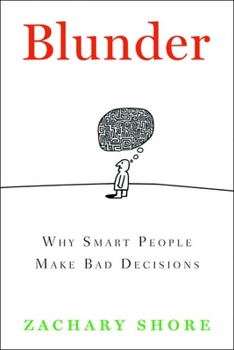Blunder: Why Smart People Make Bad Decisions
Select Format
Select Condition 
Book Overview
"Engaging...Teases out the cause and effect of seven [cognition] traps with witty stories of famous blunders...to teach the basis of good judgment. L ike all good historians he's hoping we can avoid... This description may be from another edition of this product.
Format:Hardcover
Language:English
ISBN:1596912421
ISBN13:9781596912427
Release Date:October 2008
Publisher:Bloomsbury Publishing PLC
Length:260 Pages
Weight:0.94 lbs.
Dimensions:1.0" x 5.8" x 8.5"
Customer Reviews
6 ratings
Great
Published by l. , 1 year ago
Worth the read.
Avoid Blunders by reading Blunder
Published by Thriftbooks.com User , 14 years ago
I found this book fascinating. The story about Thomas Edison pushing DC current as being superior even though AC current was overwhelming superior. Why would such a smart man make such a mistake? The term is cognition trap which we can all fall into and do. Static Cling is were people refuse to let go of out dated ideas. Whereas the infomiser(cool term) tries to keep information away from others assuming that gives him the advantage to the infovoider who thinks ignoring what's going on around him will keep him safe. Saddam Hussein through infomisering achieved his short term goals but lost in the long run. King Mongkut who skill fully kept Thailand an independent country when all the surrounding countries fell to the Imperial Powers. How did King Mongkut do it? I was totally impressed. How did Louis Gerstner take an aging giant IBM and turn it into a competitive powerhouse? Reading this book will allow you to recognize cognition traps which means you are more likely to be effective in whatever you do.
Blunder - not a bad decision to read this book
Published by Thriftbooks.com User , 15 years ago
The author is a historian who seems to specialize in military history from the point of view of strategic studies. He begins by defining a blunder as a cognitive act, that is, one that involves conscious decision making, and which has made matters worse. This would be in contrast to an error, which may or may not have involved any conscious thought and could just as well have made matters better as making them worse. He then goes on to analyze seven major causes of blunders- Exposure Anxiety: The fear of being seen as weak, Flatview: Seeing the world in one dimension, Cure-allism: Believing that one size really fits all, Infomania: The obsessive relationship to information, Mirror Imaging: Thinking the other side thinks like us Static Cling: Refusal to accept a changing world, and Cognition These are illustrated by various examples. Usually one would expect a lot of military examples from such an author, and there are some, but on the whole these are fairly balanced with examples outside of the strict military domain. Many American authors also tend to spend a great deal of time analyzing 9/11 from the point of view of their thesis, and once again, although 9/11 is mentioned, it is used in a balanced way. The author is also refreshingly frank about criticizing American decisions and policies in various international involvements such as Viet Nam and Iraq. I found the examples of King Mongkut of Siam and Ho Chi Min of Viet Nam to be the most interesting because the analysis was new to me and these examples will certainly lead to some additional reading on my part. The King of Siam used his skills as a statesmen to keep his country from falling to imperialist pressures that swallowed up most of the southeast asian empires of his day. Ho Chi Min lead the Vietnamese people in resistance and ultimate victory over two countries with vastly superior technologies and armies, namely those of the French and Americans, surely there are lessons to be learned in that feat. Overall, a thoughtful and brisk read.
Smart, enlightening.
Published by Thriftbooks.com User , 15 years ago
A most pleasant, interesting, enlightening and hopefully life changing read. You finish, realizing that you are now aware of a handful of flaws in thinking that you have made many times, but conscious that aware of them, you will try consciously to make less of them in the future. Thank you Mr. Shore.
A Blunder is...not buying this book
Published by Thriftbooks.com User , 15 years ago
Dr. Shore, in an accessible style, provides an excellent survey of great BAD decisions from ancient times to today. From the first chapter on Edison, he hooks the reader with well told tales of disaster, and more importantly, provides a roadmap for how to recognize and avoid blunders in the future. This is a book for the general public, as opposed to a scholarly audience, however, the history is sound and the conclusions insightful. While some of the terms the author coins seem somewhat forced, he provides a useful framework for classifying (and therefore identifying) types of blunders, with fleshed out examples and colorful anecdotes to keep the reader interested. A great book for your management team, something that can be read quickly but with more heft than "Who Moved My Cheese"-type books. A book I have since loaned out to friends and family, and a rewarding second read. Strongly recommend.
The greatest blunder ever told
Published by Thriftbooks.com User , 15 years ago
One way in which I judge book is how well it stays with me. This book has come to mind on multiple instances since my having read it a few weeks ago. What it does well is clearly identify several causes which lead to the making of bad decisions. These causes are not defined in deep psychological terms but rather in layman's terms. The author makes his point by providing well-told examples in history. At the same time, these same examples can readily be applied to everyday life. This pragmatic approach makes the book both interesting and quite informative.





